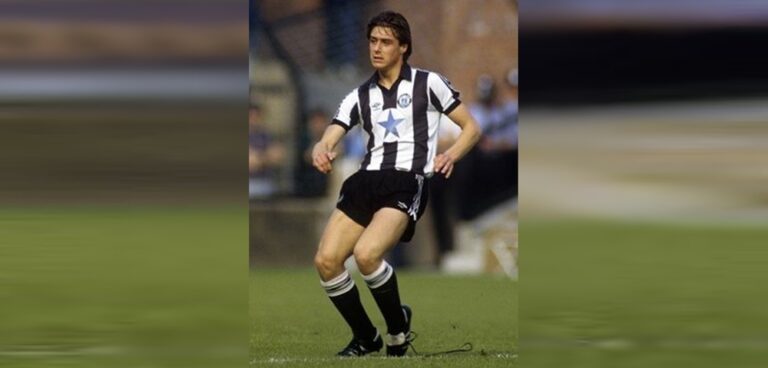From an early age, Derek Bell was captivated by the game of football, playing on the fields and in the backyards of the West End of Newcastle. Growing up in an area marked by deprivation and social poverty presented challenges for many of his peers. However, Derek was fortunate; both his parents held full-time jobs, ensuring that he never had to worry about getting a new pair of football boots or a Newcastle home kit.
Derek’s father was a professional footballer with Partick Thistle in the late 1940s, winning the Scottish Cup final against the mighty Celtic in 1945. After his father passed away, Derek and his brother donated his gold medal to the Hampden Park Museum, where it remains to this day.
Derek’s childhood dream was to play for his hometown club, Newcastle United. At the age of 10, he joined a local boys’ club, Montague and North Fenham—affectionately known as “The Monty.” His brother, two years his senior, played there, and with his mother working in the café, joining this reputable club felt like a natural fit. How wrong he was.
Rising Through the Ranks
Derek immersed himself in football and his talent did not go unnoticed. He was scouted by numerous clubs, including Manchester United, West Brom, Leicester, Southampton, and Burnley. All of them expressed interest in signing him, but when Newcastle came knocking at his parents’ door, he knew it was the club for him. He signed with Newcastle on his 14th birthday and represented his school, Newcastle School Boys, and the Northumberland County FA while still playing for “The Monty” under coach George Ormond.
At the age of 16, Derek left school to become an apprentice footballer with Newcastle. He played in the youth team and reserves, and on his 18th birthday, he signed a two-year professional contract. He made his first-team debut at 18 against Blackburn Rovers, where despite a 4-2 loss, he was voted Man of the Match by the Newcastle fans.
The arrival of Kevin Keegan from Hamburg FC, along with stars like Terry McDermott, Mick Shannon, and Chris Waddle, filled Derek with excitement as he played in front of 38,000 fervent fans. However, just four weeks into the season, while playing in the reserves at Old Trafford, disaster struck: he damaged his crucial anterior ligaments, abruptly ending his promising career.
The Hidden Heartbreak
The heartbreak of losing his football career paled in comparison to the hidden torment he had endured for many years. After leaving football, Derek secured a job in housing for Newcastle City Council, where he dedicated 25 years to working in social housing across the city. While challenging, this role was rewarding, allowing him to help homeless and vulnerable adults settle into their homes.
He later transitioned into the care industry, where he looked after vulnerable adults in their own homes. He thoroughly enjoyed this work, as he provided support to those in need, helping them find hope and happiness.
However, the darker side of Derek’s past was about to come to light. Shortly after joining “The Monty”, when he was 10 years old, he was sexually abused by his coach, George Ormond. Unable to speak out—thanks to Ormond’s manipulation—Derek suffered in silence for 25 years. The abuse escalated, encompassing sexual, physical, and emotional torment, with threats that his football career would be ruined if he dared to tell anyone.
When he left the boys’ club to join Newcastle at 16, he hoped he had escaped Ormond’s grasp. Unfortunately, that was just the beginning of his nightly nightmares, filled with anxiety and a deep sense of despair.
Struggles with Mental Health
By 1995, after three failed attempts to end his life, Derek was sectioned under the Mental Health Act, Section 2, spending four months in a hospital. Even during this time, he could not disclose the full extent of his abuse to his psychiatrist or doctors. He was prescribed medication for anxiety and depression, which he still takes today.
In 2000, Derek’s path crossed with Ormond once more. Now coaching at Newcastle United, Ormond’s presence reignited Derek’s memories of abuse. Determined to confront his tormentor, he visited Ormond’s home, where he recorded their conversation. Ormond confessed to the abuse but offered no apology, insisting that Derek should remain silent.
The next day, Derek brought the recording to Northumbria Police. In 2002, Ormond was convicted at Newcastle Crown Court and sentenced to six years in prison, of which he served four. Despite this victory, the nightmares lingered.
A Turning Point for Justice
In 2016, a pivotal moment arrived when former professional footballer Andy Woodward spoke publicly about the abuse he endured from Barry Bennell. Inspired by Woodward’s bravery, Derek reached out to a helpline, sharing his own experience and expressing his desire to support other victims.
This contact led to a two-year investigation by Northumbria Police into Ormond, resulting in 47 witnesses coming forward and 18 additional victims. In 2018, Ormond was convicted for 20 years of abuse spanning from 1973 to 1988. This trial provided Derek with a sense of closure, allowing him to begin healing.
Advocating for Change and Healing
Throughout this tumultuous journey, Derek underwent years of therapy and counseling. He founded a company that delivers safeguarding and mental health training, obtaining qualifications to become a trainer. With his business partner, he began providing safeguarding training to the care industry, where he met Lisa and Sara from Starz Fostering.
Now a panel member for Starz Fostering CIC, Derek finds fulfilment in working with an organisation that shares his passion for helping others. He feels honoured to be part of a team committed to high standards and dedicated to supporting those who need a helping hand, much like he once did.
Derek Bell’s story is a powerful testament to resilience and the importance of speaking out against abuse. While he has many more stories to share, this snapshot captures the profound impact of a broken heart and the journey towards healing and advocacy.

